Red Is for the Bride, Not You: What Wedding Guests Should Know About Cultural Traditions
Brides from different cultures share the mistakes wedding guests still make and what to do instead.

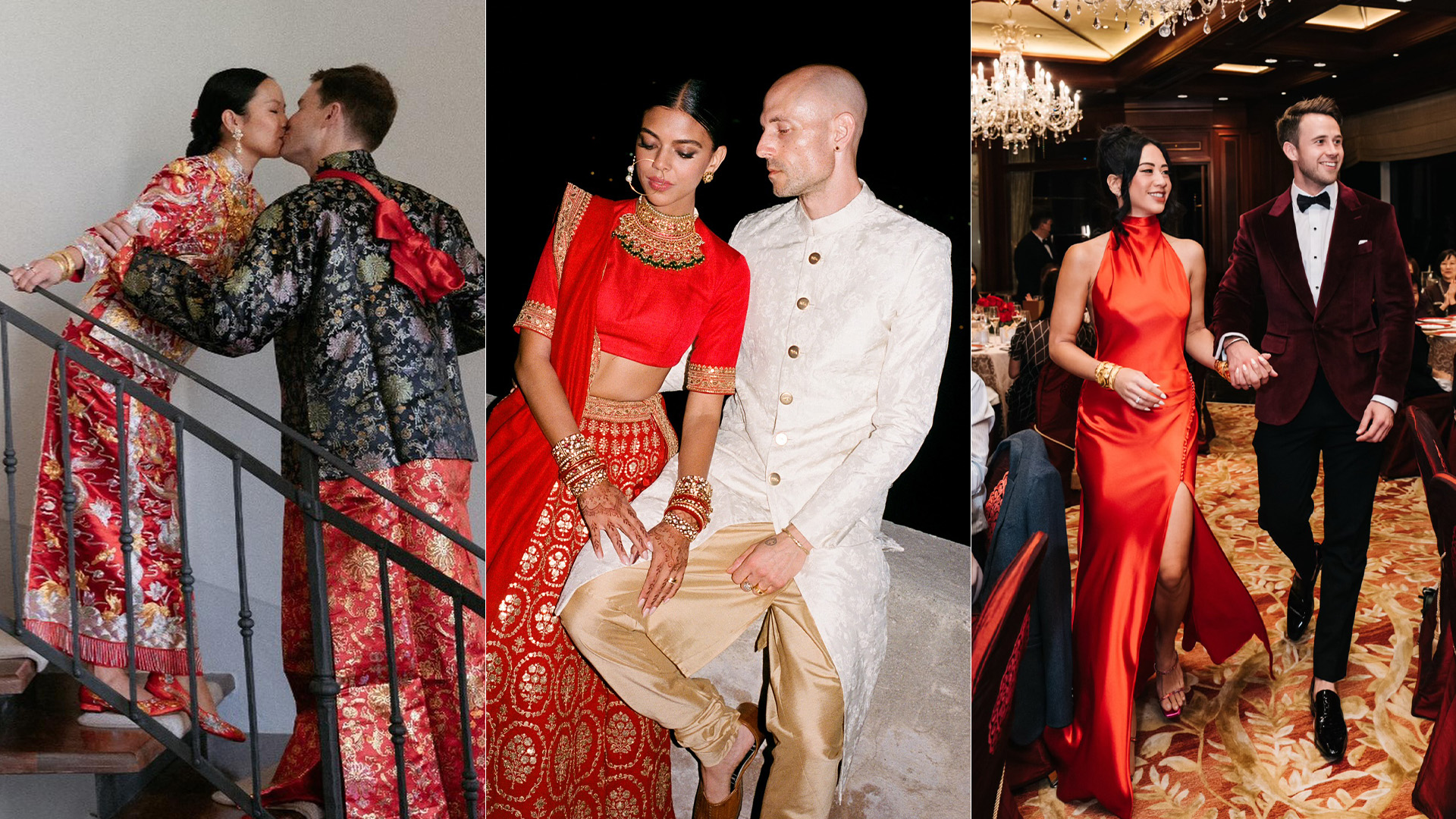
As someone who attends a lot of weddings (and has way too many Notes lists about what to wear to each one), I'm always thinking about the details—what's appropriate, what feels celebratory, and how to show up in a way that's respectful to the couple and their culture. Lately, I've been thinking more deeply about what it really means to be a good guest when you're invited into a cultural tradition that's not your own.
During AAPI Heritage Month, I specifically wanted to slow down and spend time learning about the many traditions that exist across East, Southeast, and South Asian weddings—not just the aesthetics we often admire from afar but also the deeper layers of etiquette and meaning behind them. I started reaching out to friends, creatives, and community members from across the Asian diaspora to ask questions I genuinely wanted answers to: What's considered respectful when it comes to guest attire? Are there colors or silhouettes that hold symbolic meaning (*ahem* red)? What do gift-giving customs look like? What are the moments that matter most?
This story is the result of those generous conversations. Rather than offering a checklist of dos and don'ts, my goal is to share personal insights from people who have either gotten married within these traditions or grown up attending weddings that reflect them. Everyone I spoke to had a unique perspective shaped by their family, region, and lived experience, but a common thread ran through each answer. These celebrations carry deep cultural significance, and there's beauty in taking the time to learn the "why" behind the "what."
Whether you're attending an Asian wedding this year or simply want to be a more thoughtful guest, I hope these stories offer a deeper sense of understanding and a reminder that respect doesn't have to come at the expense of style. It just means paying attention.
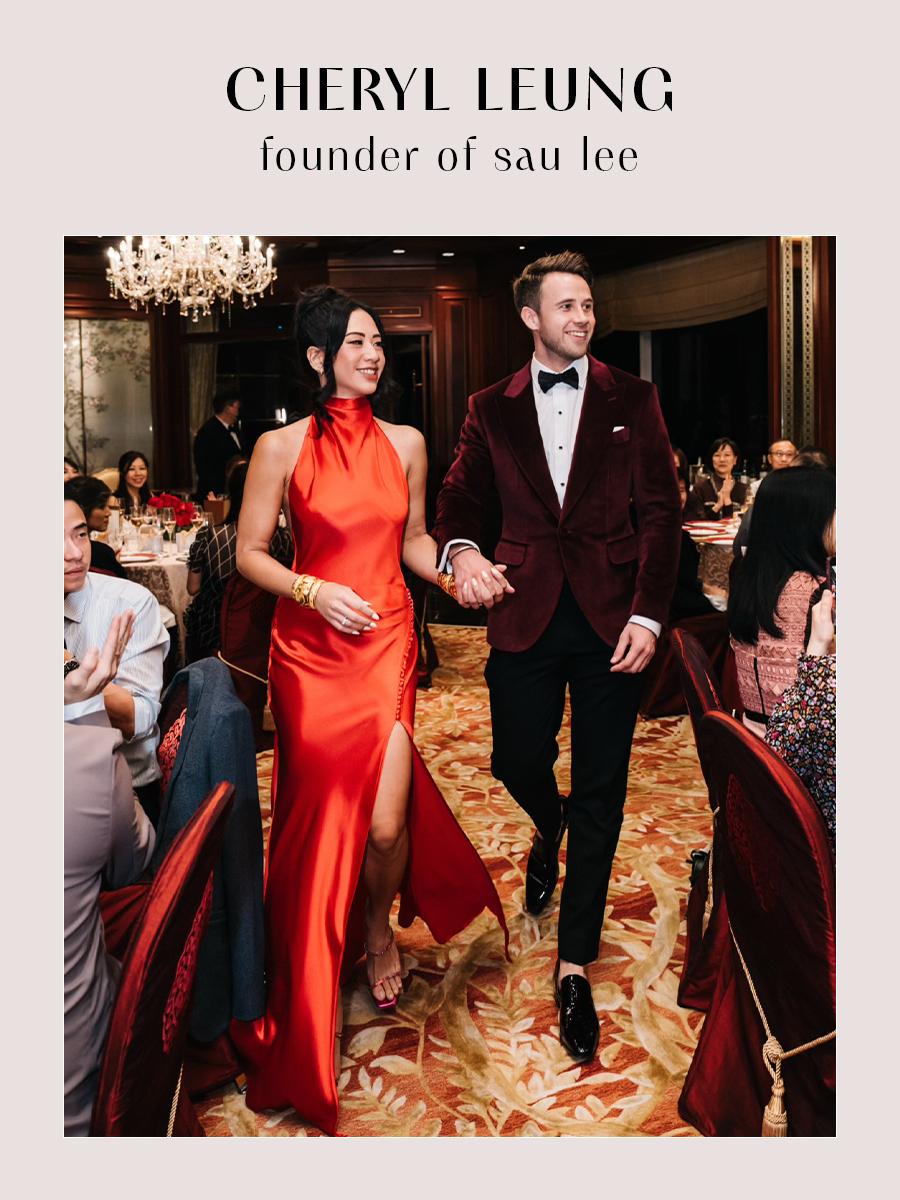
Wearing her own design
Before we dive in, would you mind sharing what cultural background or country you identify with when it comes to wedding traditions?
My cultural roots are Chinese, and those traditions have always been a meaningful source of inspiration—both personally and professionally. Chinese weddings are filled with symbolism and beauty, from the intricate tea ceremonies to the palette of auspicious colors. They celebrate not only love but also legacy and community, which is something we strive to reflect in the world of Sau Lee.
Were there any specific cultural traditions you incorporated into your wedding that were especially meaningful to you?
The tea ceremony was very special to me. It's such an intimate moment where the couple expresses deep respect to their elders and, in return, receives blessings for the future. It's more than ritual; it's a bridge between generations, honoring where we come from as we step into a new chapter.
Are there any guest dress code expectations that you wish more people understood?
Weddings are a time to celebrate love, joy, and beauty, and I always think fashion is such a fun way to join in the spirit! In Chinese culture, colors carry a lot of meaning, and it's lovely when guests lean into the more festive shades. Pinks, golds, soft pastels, and bright colors in general are very welcome. Traditionally, the bride will have a red dress, and in modern culture, they may also wear a white wedding gown, so these two colors are generally not worn by guests.
How do you feel about non-Asian guests wearing traditional attire to a wedding? Is there a respectful way to approach it?
I think it's a beautiful gesture when done with respect. Fashion is such a powerful form of appreciation, and wearing a cheongsam, for example, can be a meaningful way to celebrate the culture you're stepping into for the day.
If you're curious or unsure, just ask! Most couples are thrilled when their guests want to engage with their traditions. I've always believed weddings are about connection and joy, and seeing people from all backgrounds come together in that spirit is what makes them so magical.
Are there any gift-giving customs or taboos that might surprise people unfamiliar with your cultural background?
There are some fun traditions around gifts in Chinese culture! For weddings, it's very common—and totally appreciated—to give red envelopes with money, which symbolize good luck and happiness.
There's also a little superstition around numbers, so people tend to go for even numbers, which are considered lucky, and might skip the number four because of how it sounds phonetically. But overall, it's all about the spirit in which something is given.
What's one thing you wish more people knew about weddings in your culture?
That they're full of joy and personality! There is a blend of intimate and beautiful traditions—like the tea ceremony and the hair-combing ceremony with the mother of the bride the night before—but there's also so much playfulness. I love the "door games," where the groom and his groomsmen have to work (and sometimes sing or dance!) to earn their way in to see the bride, and the outfit changes. It's like your own fashion runway throughout the day!
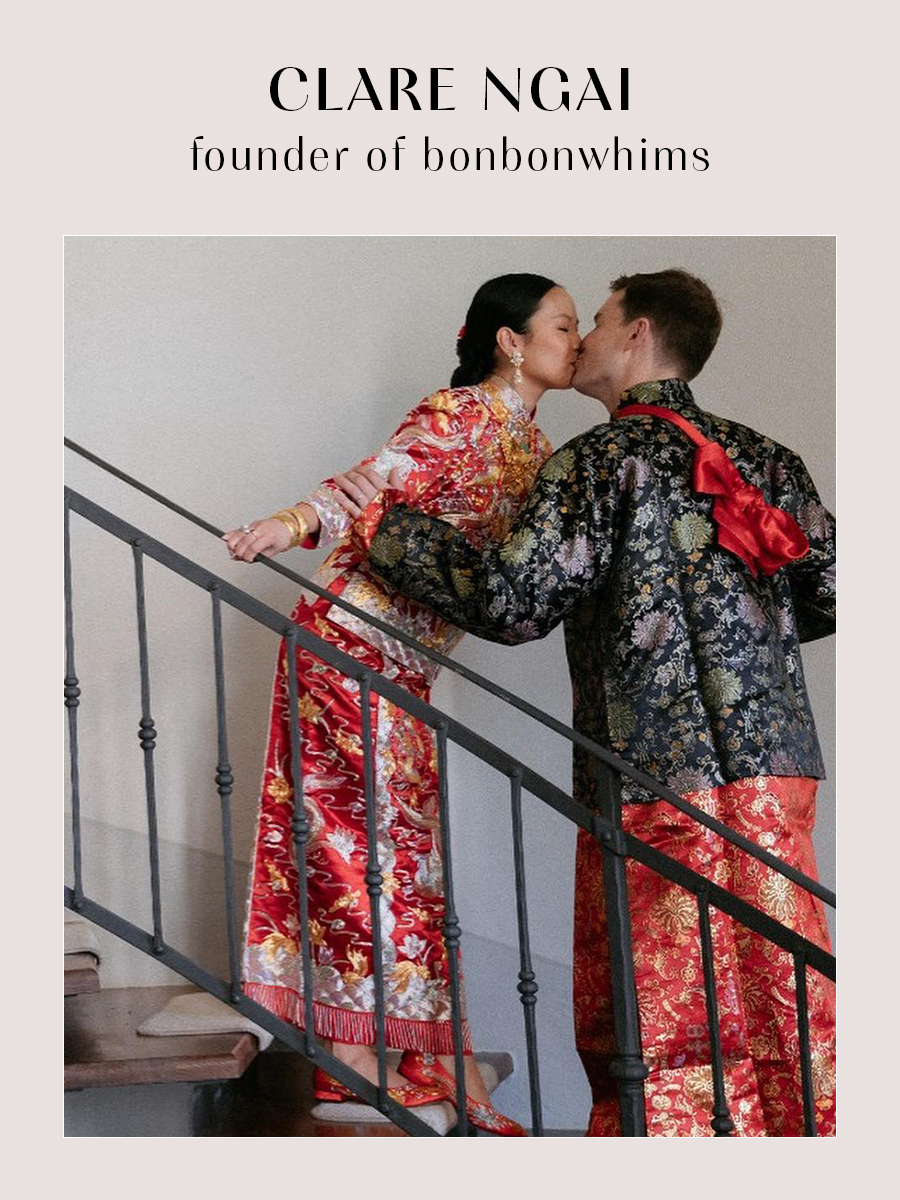
Before we dive in, would you mind sharing what cultural background or country you identify with when it comes to wedding traditions?
I grew up in Hong Kong during British colonial times, so I've always known when I got married it'd be a fusion of "East meets West" traditions as a nod to my upbringing and heritage! On my wedding weekend, I ended up wearing a traditional Chinese qun kwa (裙褂) as well as a white wedding gown.
Were there any specific cultural traditions you incorporated into your wedding that were especially meaningful to you?
The night before our wedding, as a ritual local to Hong Kong, my mom combed my hair 10 times while repeating her blessings for me and Eddie: longevity, prosperity, health, and a lifetime of happiness. It was such an intimate memory just between us.
The day of our wedding before the official ceremony, we had a traditional Chinese tea ceremony that symbolized the union of our two families. My husband and I kneeled and served tea to both of our parents, and it was such a quaint, special moment. I wore a tailor-made red-and-gold embroidered wedding gown (裙褂) from 冠南華, a traditional wedding dress atelier in Hong Kong. The silver- and gold-threaded embroidery is hand-stitched and sewn and took hundreds of hours to finish.
Are there any guest dress code expectations that you wish more people understood?
Traditionally, only the bride should wear red on her wedding day (equivalent to the bride wearing white in the U.S.), and all other guests are encouraged to wear festive and colorful attire. In Chinese culture, wearing white and black to weddings is typically frowned upon, as it symbolizes death and funerals.
How do you feel about non-Asian guests wearing traditional attire to a wedding? Is there a respectful way to approach it?
Personally, I find that unless the couple specifically requests their guests to show up and celebrate in their culture's traditional attire, it should be avoided at all costs, and that should be the end of discussion. Don't ever assume just because you're going to a Chinese wedding, for example, that you're allowed to wear a qipao. Similarly, wedding customs, practices, and dances that are unique to Asian cultures (or any cultures, for that matter) should also only be carried out at said weddings. Otherwise, it's highly disrespectful and diminishes the historical significance that comes with these traditions.
Are there any gift-giving customs or taboos that might surprise people unfamiliar with your cultural background?
In Chinese weddings, guests should avoid wearing white flowers on them or in their hair, as it also symbolizes death and funerals. Watches and clocks are not to be gifted for the same reason.
What's one thing you wish more people knew about weddings in your culture?
When it's not your culture, always be respectful, and when in doubt, ask the couple for clarifications! As a general rule of thumb, if you had to question if it's culturally appropriate, it's likely not. I think there are a lot of justifying conversations about "cultural appreciation versus appropriation" happening in recent years, but personally, I think it's all relative to the individuals. Unless the couple has given you an explicit okay, steer clear!
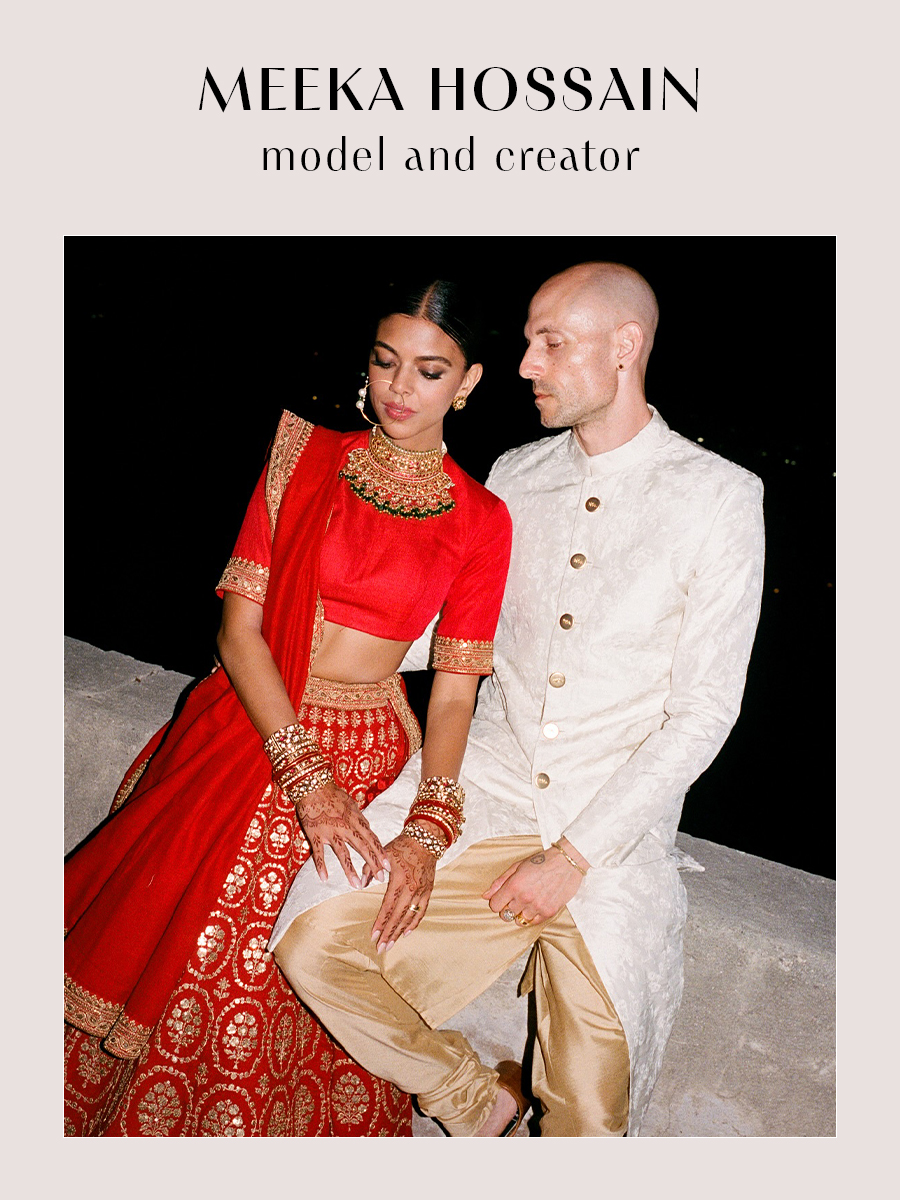
Before we dive in, would you mind sharing what cultural background or country you identify with when it comes to wedding traditions?
I'm Bengali, from Bangladesh, and for my wedding, I blended traditional Bengali customs with Indian influences, especially those inspired by the vibrancy and drama of Bollywood.
Were there any specific cultural traditions you incorporated into your wedding that were especially meaningful to you?
Yes, there were three cultural traditions that were especially meaningful to me during our wedding. One of the most significant was the gaye holud, a beloved Bengali pre-wedding ceremony rooted in tradition, color, and joy. "Holud" literally means turmeric, and during this ritual, family and friends shower the couple with turmeric paste to bless them and bring out a natural glow.
Traditionally, everyone wears yellow, the décor is yellow, and even the food often reflects the theme. Since we had a fusion wedding, we put our own spin on the tradition. For our holud, which doubled as our wedding rehearsal, I chose to wear a white dress embroidered in India and added a dupatta-style neck piece as a nod to my heritage. My nine bridesmaids and family members all wore yellow, allowing us to preserve the spirit of the ceremony while blending it with my personal aesthetic.
The second was the Indian "ring in the rice" game. After we exchanged vows, we tossed our wedding rings into a bowl of rice, and whoever found theirs first is said to "wear the pants" in the marriage. Naturally, I won. :)
The third—and probably my favorite—was a fully choreographed five-minute Bollywood dance performed by our entire wedding party of 20 people. It was incredibly fun teaching my friends about Bollywood films, music, and how to dance in a sari. I was honestly blown away by how into it everyone got. It truly felt like a scene from a Bollywood movie—exactly the joyful, cinematic moment I had dreamed of.
Are there any guest dress code expectations that you wish more people understood?
Yes, there are definitely guest dress code expectations in Bengali culture. Traditionally, the bride wears red—which I did for my second look and for the majority of the evening—so guests were asked to avoid wearing red. White and black are also typically avoided, as Bengali weddings are vibrant celebrations of love and color. Guests are encouraged to embrace that spirit by dressing in bold, festive hues.
How do you feel about non-Asian guests wearing traditional attire to a wedding? Is there a respectful way to approach it?
I believe that when you're invited and encouraged to wear clothing from another culture, it can be a beautiful way to participate and show respect. Several of my non-Asian guests asked if it would be appropriate, and I appreciated that they took the time to ask. As long as it's approached with curiosity and sincerity—and especially when it's encouraged by the hosts—I think it's absolutely welcome.
For example, eight out of my nine bridesmaids weren't Bengali, and I asked them all to wear saris so they could feel more connected to my culture. It ended up being one of my favorite parts of the wedding—watching them fully embrace the experience and feel beautiful in their saris.
Are there any gift-giving customs or taboos that might surprise people unfamiliar with your cultural background?
There aren't many specific gift-giving taboos in Bengali culture, but not bringing a gift at all might be seen as unusual. Bengali weddings are such a significant celebration that giving a gift is simply expected. It's part of the spirit of generosity and joy that surrounds the event.
What's one thing you wish more people knew about weddings in your culture?
I wish more people knew just how vibrant and multiday Bengali weddings are. They usually last four to five days, with each event full of its own traditions, outfits, and meaning. The food is incredible, the clothing is full of rich, saturated color, and there's music and dancing late into the night. It's a full sensory experience—in the best way possible.
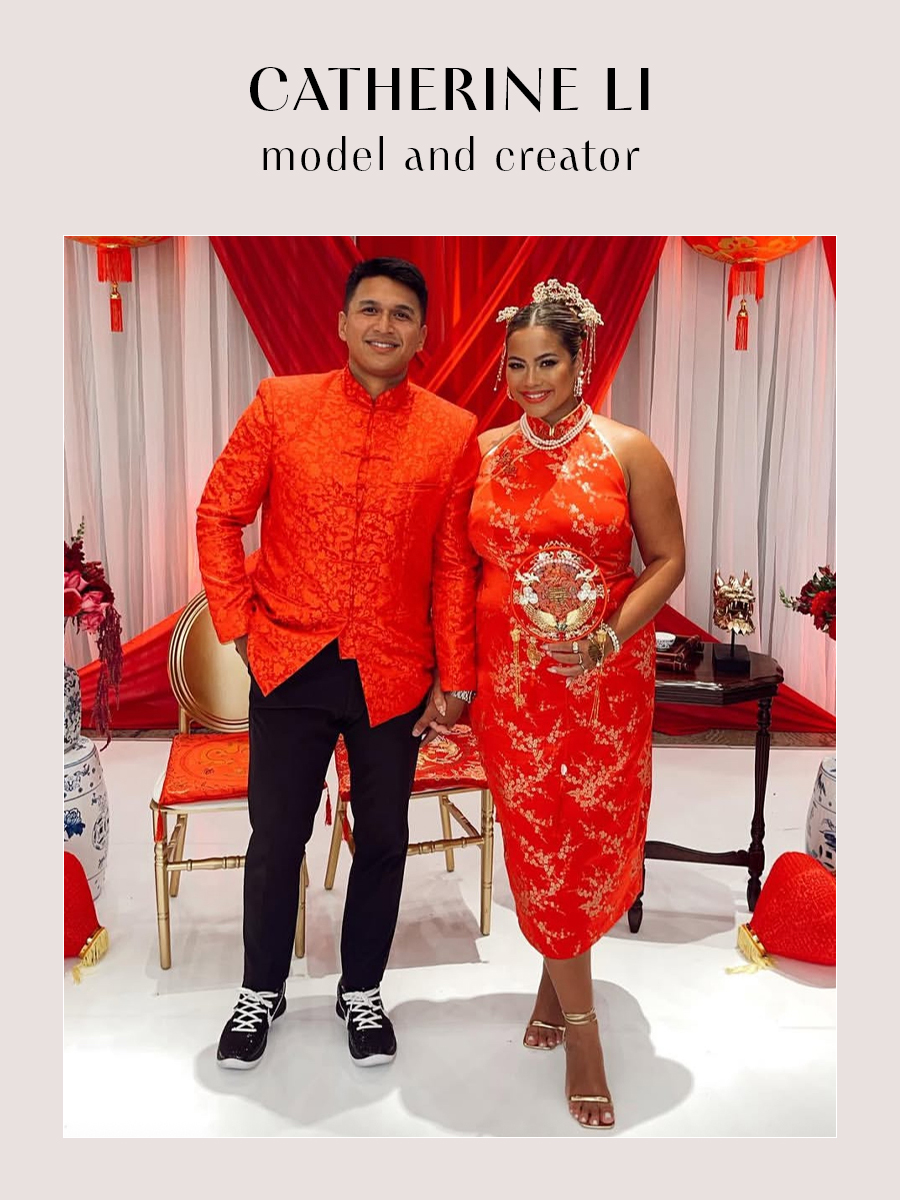
Before we dive in, would you mind sharing what cultural background or country you identify with when it comes to wedding traditions?
I am half Chinese, and my husband is full Filipino. My father and both of his parents are immigrants. We did a tea ceremony for my Chinese side and invited our families to wear traditional wear to the wedding and tea ceremony. We also welcomed our guests to wear traditional wear, and his family wore barongs for our wedding. For our third outfit, he wore a barong, and I wore my version of a Filipina dress that I customized with East Meets West for our wedding. They are a company that customizes Asian wedding wear.
Were there any specific cultural traditions you incorporated into your wedding that were especially meaningful to you?
The traditional tea ceremony with dragons was extremely important to me. My mom and dad gifted me gold bracelets as well that I will always cherish. It was also important for my husband to wear a barong. We also had a Catholic ceremony, which is very important within the Filipino culture.
Are there any guest dress code expectations that you wish more people understood?
For a Chinese tea ceremony, I believe guests are not to wear red. That did not happen at my wedding, but also, my husband and I are pretty relaxed.
How do you feel about non-Asian guests wearing traditional attire to a wedding? Is there a respectful way to approach it?
My brother actually had an Indian wedding and had all the guests wear saris. They actually provided them! I think it is a great way to introduce people to the culture. I think if you want to incorporate it in your wedding respectfully, you have to educate your guests. I would suggest giving your guests [a] "dos and don'ts" list.
Are there any gift-giving customs or taboos that might surprise people unfamiliar with your cultural background?
For my family, what was being served at our tea ceremony was very important. [I'm] not sure if that is a custom, but they had to make sure there was a fish, chicken, a certain soup, etc. I allowed my dad to take charge of that, and he really enjoyed planning it.
What's one thing you wish more people knew about weddings in your culture?
I would love people to be more open to trying new things and be excited enough to maybe do some research before attending the wedding on what to expect and wear. My biggest pet peeve is when people don't want to try new foods or be open-minded on new experiences.
This story was originally published at an earlier date and has since been updated.

Sierra Mayhew is a fashion editor atBest Knockoff Luxury Clothing , bringing a decade of industry experience to the editorial team. Since joining in 2021, she has made her mark by blending luxury and accessible fashion, decoding runway trends, and curating must-have shopping lists. Before joiningBest Knockoff Luxury Clothing , Sierra sharpened her skills at Harper's Bazaar and Elle, with bylines in Bazaar.com and collaborated with iconic brands such as Gucci and Ferragamo. A graduate of the University of Notre Dame, Sierra translates editorial expertise into viral social content, making fashion engaging for a new generation. Her unique perspective is rooted in her love for travel, music, and discovering the hidden gems that make New York City a constant source of inspiration.